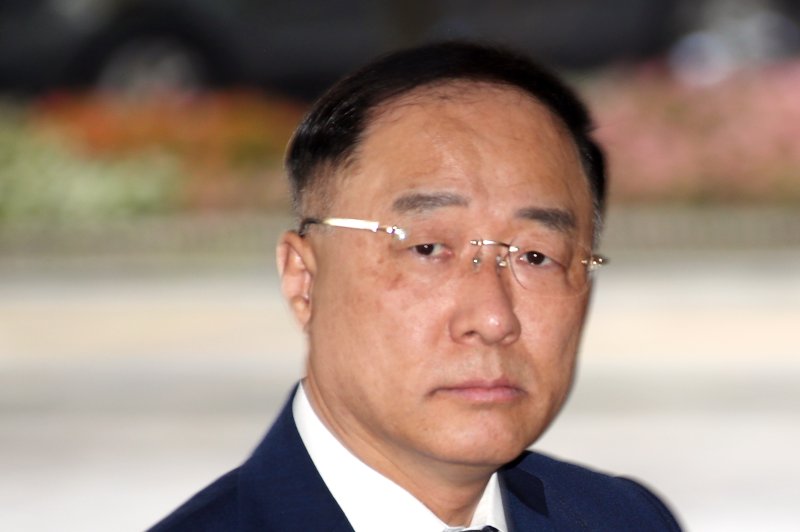Finance Minister Hong Nam-ki said he will be closely watching for negative economic impacts from the ongoing South Korea-Japan trade spat. Photo by Yonhap
SEJONG, Aug. 23 (UPI) -- South Korea said Friday it will take steps to try to minimize any possible fallout from the trade row with Japan, which may further escalate down the road after its decision to terminate a military information-sharing pact with its neighbor.
"We will closely manage the situation to make sure that the negative economic impact is minimized under all circumstances," Finance Minister Hong Nam-ki said in a meeting with reporters in Sejong.
The comments came a day after South Korea announced it will not extend the General Security of Military Information Agreement with Japan, in its strongest reaction yet to Japan's export restrictions.
Hong said South Korea will maintain round-the-clock tabs on financial markets and a contingency plan is in place to cope with any increased volatility over Seoul's decision to scrap the military pact with Japan.
"From an economic perspective, difficulties and uncertainty may not be easily cleared away, depending on how Japan reacts" over the decision to terminate the military pact, Hong said in a separate meeting with heads of state-run and independent think tanks in Seoul. "It's difficult to predict how things will play out."
South Korea's latest move comes as bilateral relations plunged to their lowest levels in recent decades over a trade row stemming from Japan's wartime use of Koreans as forced labor during its 1910-45 colonial rule of the Korean Peninsula.
Japan has imposed tighter regulations on exports to South Korea of three materials -- resist, etching gas and fluorinated polyimide -- that are critical for the production of semiconductors and flexible displays.
Japan also removed South Korea from its "whitelist" of trusted trading partners in retaliation against last year's South Korean Supreme Court rulings ordering Japanese firms to compensate South Korean victims of forced labor.
Hong reiterated South Korea's demand that Japan end its export restrictions, but the recent feud between the neighbors suggests they are unlikely to patch up their frayed ties and put their economic cooperation back on track anytime soon.
Concerns have mounted that the trade war between the two countries could weigh on South Korea's economy, but Hong said it's not the time to revise down South Korea's growth target for this year.
On Thursday, Hong told lawmakers that "It won't be easy" for South Korea to pull off its 2.4 percent or 2.5 percent growth target.
In July, South Korea slashed its economic growth outlook for this year to between 2.4 percent and 2.5 percent from its previous forecast of between 2.6 percent and 2.7 percent in December, citing weak exports and sluggish investment.
Global rating agency Standard & Poor's has sharply cut its growth forecast for South Korea's economy this year to 2 percent from its previous forecast of 2.4 percent in April due to rising uncertainty about the global trade outlook and weaker consumption.
In a move to revitalize the economy, Hong said that the government is considering raising next year's budget to 513 trillion won (US$423.5 billion), up 9 percent from 2019.
The draft budget, if passed by the parliament, would raise South Korea's national debt to the upper end of 39 percent of its gross domestic product in 2020, compared with 37.2 percent in 2019.















